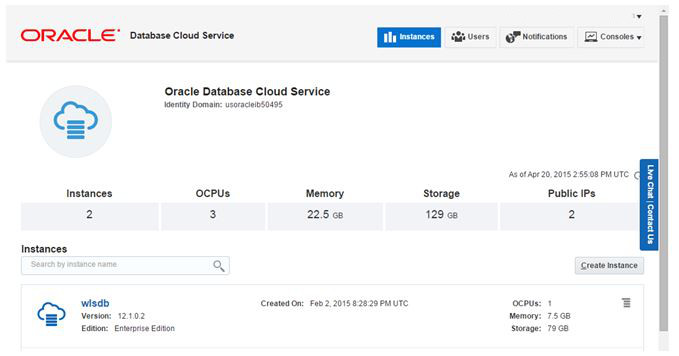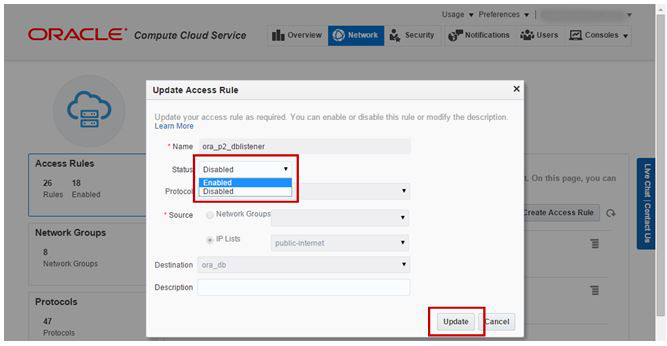How To Access Sql Developer From Oracle Cloud Services
Before You lot Brainstorm
Purpose
This tutorial covers how to connect to a Oracle Database Cloud Service (DBCS) instance using Oracle SQL Developer.
Time to Complete
Approximately xxx minutes.
Introduction
When you create an Oracle Java Deject Service (JCS) instance you always need to provide a pre-existing Oracle Database Cloud Service case to which your JCS instance volition connect.
This tutorial shows you lot how to identify the underlying DB service details and use them to create a connectedness from a local motorcar running Oracle SQL Programmer.
Software Requirements
Oracle SQL Programmer
Oracle SQL Developer must be installed on your local automobile.
Prerequisites
Before starting this tutorial, you should accept:
- A JCS instance already bachelor.
- Oracle SQL Programmer installed your computer, as listed in a higher place.
Identifying Oracle DB Deject Service in utilise
Find the Oracle Database Cloud Service case in use
-
Sign in to the My Services awarding at https://cloud.oracle.com/sign_in after selecting the appropriate Public Cloud Services Data Center option. The My Services Dashboard appears.
-
In the Oracle Java Cloud Service section, click Open Service Console. The Oracle Java Cloud Service Console page is displayed. An example is shown in the following illustration.

Description of this image -
On your Oracle Coffee Deject Service Console, click the link that represents the service instance you desire to manage.

Description of this image The details of the selected service example show up, including a list with all the machines that make up the service. Right below the machine list, there is the Associated Services section. There yous will find the name of the Oracle Database Cloud Service instance this JCS case is using.

Clarification of this image
Find the Oracle Database Cloud Service instance connection details
-
Scroll up to the peak of the folio. Click Consoles and so click on the Database Cloud Service item.
-
 Description of this epitome
Description of this epitomeThe Oracle Database Cloud Service Console page is displayed, showing the list of DBCS instances available to you.

Description of this paradigm -
On your Oracle Database Deject Service Panel folio, click the link that matches the service instance name you lot collected in previous step. In our example wlsdb.

Description of this epitome The details of the selected DBCS example show up, including the DB machine public IP address, the listener port and the instance proper noun. The Connect Descriptor aspect tells u.s. about the service name that we volition use.

Description of this image
Enabling Admission to the DBCS Case from the local auto
By default, the DBCS example is not reachable to IP addresses outside your cloud service identity domain. In gild to connect to the DBCS example using desktop tools, such as Oracle SQL Programmer, we take 2 choices:
- Create an SSH tunnel and configure port forwarding appropriately
- Enable the access dominion that grants access to the DB service from external IPs
The steps that are required to create an SSH tunnel to gain access to specific services running on the Oracle Cloud Services VMs from the local computer are fully documented in a number of different tutorials, for example:
- Creating an SSH Tunnel to a Port in the Virtual Motorcar
- Connect to a Database Cloud Service (Database every bit a Service) Instance Through an SSH Tunnel
Now, nosotros volition focus on how to alter the admission dominion in this tutorial
.
Locate the admission dominion that is preventing u.s.a. from getting access to the DB service from external IPs
-
If not already signed in to the My Services application at https://cloud.oracle.com/sign_in, do so over again after selecting the advisable Public Cloud Services Data Eye selection. The My Services Dashboard appears. (Or yous can admission the Compute Cloud Service from the Consoles menu, like we did above when navigating from JCS to DBCS)
-
In the Oracle Compute Cloud Service section, click Open Service Console. The Oracle Compute Deject Service Console folio is displayed. An instance is shown in the post-obit illustration.

Description of this image -
Click Network to come across the existing listing of access rules
Description of this paradigm -
Enter ora_p2_dblistener as the access rule name and click the magnifier icon
 . That will filter out from the list admission rules that are of no interest at this moment.
. That will filter out from the list admission rules that are of no interest at this moment.
Description of this epitome -
Hover the admission rules and then that a tooltip shows upwards. Locate the VM that hosts the database Service to which yous want to get access. If you have trouble finding the rule, remember that information technology is initially disabled and therefore decorated with the
 icon
icon
Description of this image
Edit and enable the access rule
-
Click the preferences
 icon and select Update
icon and select Update 
Clarification of this image -
On the Update Access Dominion dialog, change Status to Enabled and click Update.

Description of this prototype
Connecting to the DB using Oracle SQL Developer
Once we know the connection details to the underlying DB service and access from the local machine has been enabled, we may connect to the DBCS instance from Oracle SQL Developer as we would practice for an on-prem database service.
Connecting to the DB using Oracle SQL Developer
-
Start Oracle SQL Developer
-
In the Connections view click on the
 icon to create a new DB connection
icon to create a new DB connection 
Description of this image Utilise the public IP address, the listener port and the service proper name details obtained in Identifying Oracle DB Cloud Service in utilise to fill out the grade. Click Examination and, when succeeded, click Connect.

Description of this image
Test your connection
-
Result whatsoever valid SQL clause to test your newly created connection.

Description of this prototype
Desire to Larn More?
-
Introduction to Oracle Database Deject Service - DBaaS Series
-
Learn More About Oracle Database Deject Service
Source: https://www.oracle.com/webfolder/technetwork/tutorials/obe/cloud/paas/accessdbinstance/accessdbinstance.html
Posted by: gaulkesumbing1949.blogspot.com



0 Response to "How To Access Sql Developer From Oracle Cloud Services"
Post a Comment